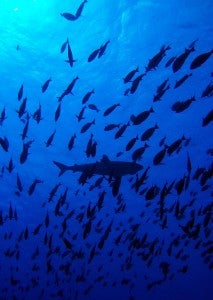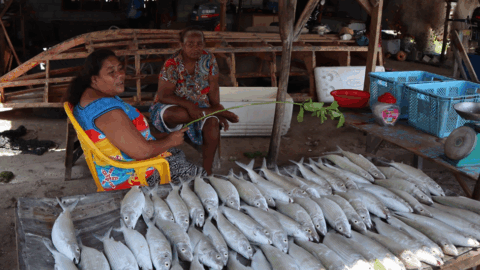New Science Paper: Status and Solutions for the World’s Unassessed Fisheries

The world’s fish stocks can be rebuilt to provide more nourishment and economic value to the millions of people who rely on the ocean for food—if we step up now and make aligning these incentives a global priority.
The magazine Science has published a study that provides new insights into thousands of fisheries where scientific data has not been historically available. These “data poor” fisheries make up a majority of the world’s catch, around 80 percent. According to this new research, many of these fisheries are facing collapse, but there is still time to turn the situation around. The study indicates that it is possible for fisheries to recover globally, which would increase the abundance of fish in the ocean by 56% and in some fisheries’ yields could more than double.
With these new assessments, fishery managers and world leaders can have a more comprehensive view of the status of our global fisheries. There are many new insights into previously unmeasured fisheries, using new methodology that can have enormous implications for managing the resource sustainably.
The report also provides some hope and insights on how the world can reverse these trends.
This study published in Science is part of a larger work called “Charting a Course to Sustainable Fisheries,” released this week by California Environmental Associates. In it, there is evidence that the rights based management programs, like catch shares, implemented in the United States have been working. Part of the report analyzes progress in U.S. fisheries and shows that solid, science-based catch limits along with rights based management and other measures have been effective in addressing the problems of overfishing.
Listen to a recording of a press conference held by authors Steven Gaines and Christopher Costello, as well as Michael Arbuckle of the World Bank, Brett Jenks from RARE, and Amanda Leland who is our Vice President for Oceans, for more details about the paper.
Amanda has issued the following remarks on this groundbreaking piece of research which she hopes will help NGOs, governments and others invested in preserving ocean resources, scale up tools such as catch shares and TURF reserves to a global scale.
“This study is a blueprint for recovering the world’s ocean fish populations. Five years ago I would have been terrified to read this report, but today I have hope that we can turn fisheries around and confidence that we can do it.
It may seem counter-intuitive for an environmentalist to say this, but what we’ve learned is that giving fishermen a stake in protecting the oceans is by far the most effective away to turn declining fisheries around.
The revolution is to empower fishermen to lead the way in recovering fish populations.
As Chris mentioned rights based management is going to be key to the recovery. Rights based management also known as catch shares in the US, is a system that provides Rights to fishermen, gives them Responsibilities for managing the fishery sustainably, and Rewards them when the fishery improves.
Giving fishermen a concrete stake in the fishery means that they are invested in protecting it. When overfishing ends, the amount the entire fleet can catch increases, as does fishermen’s share of the catch. Economic interest and conservation interest go hand in hand and fishermen lead the way.
There are lessons to be learned from the US which has turned a corner — fisheries have reached a 17-year high, values have increased, thanks to in part catch shares which are growing fish populations.
65% of all fish that are now caught in US waters (federal) are caught in catch share or rights based management.
EDF has partnered with fishermen in many countries to transform fisheries management. Here are three examples with stunning results, which give me hope for the future.
Last year, catch shares in three fisheries alone saved enough fish from being tossed back dead at sea to feed about one million Americans their seafood for the entire year. That is 15.9 million pounds of fish saved in one year!!!
Perhaps the biggest revolution has taken place in the Pacific where catch share fishermen have established marine protected areas outside government intervention to help avoid sensitive fish stocks. This is a complete 180 degree turn. It was not long ago that fishermen fought tooth and nail against any marine protected areas.
This model is also working in the developing world in unassessed fisheries. In Belize, after just one year of catch shares, fishermen report: an 80% increase in compliance and enforcement, 70% report an increase in their catch, and 85% of fishermen are submitting their catch data. Up from zero in just one year.
In a place where unassessed fisheries are the norm with few rules or incentives to follow them, rights-based management is working and turning the fishery around.
The key is to empower fishermen, by giving them incentives to recover fish populations.
Without making this work for fishermen there will be no way to stop the global decline and conserve fisheries that will be so important to feed a growing global population.
This study shows that recovering the world’s fisheries is absolutely critical, and, by working with fishermen, completely achievable.”












